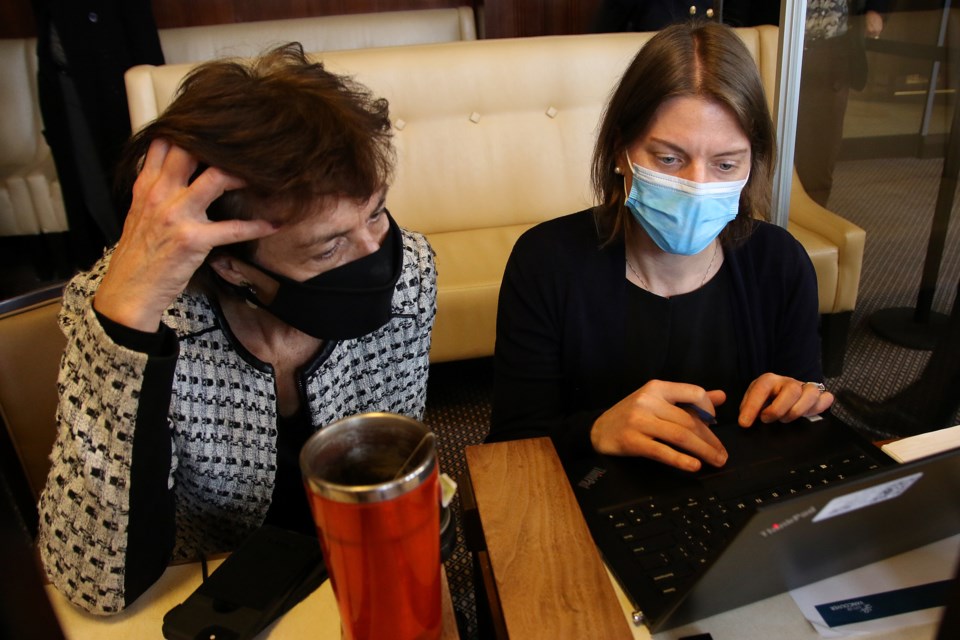The Vancouver fire and police departments received significant increases to their 2022 operating budgets Tuesday after a long day of debate at city hall that ended with council approving a property tax hike of 6.35 per cent for next year.
The tax hike includes a new annual one per cent climate tax on property owners, which aims to raise $9 million per year for new infrastructure such as electrical vehicle chargers in rental buildings and greenhouse-gas-emission-reducing retrofits to civic facilities such as community centres.
Council’s approval of a $3.1 million boost to Vancouver Fire Rescue Services’ $137.2-million net operating budget means 25 new firefighters will be added to the under-served southeast quadrant of the city.
“City council showed real leadership today by rolling up their sleeves to find funding for new firefighters in southeast Vancouver,” said Lee Lax, vice-president of public engagement for the Vancouver Fire Fighters union, Local 18, in a text message.
“While this council doesn’t agree on many things, it’s great to see them agree about the importance of a properly resourced fire rescue service.”
Police Chief Adam Palmer told council the budget requested by the Vancouver Police Department will fund the same level of service it provides now, which is being done with fewer officers than in 2009.
“This will not be an enhanced level of service that we’re providing with this budget,” said Palmer, whose department ran a deficit this year for the first time in 16 years, largely due to council’s decision in December 2020 not to fully fund almost $6 million of the VPD’s 2021 budget request.
This time around, council approved the VPD’s budget request and was obligated to add $15.7 million in arbitrated wage increases for officers, bringing the total gross dollar amount to $366.9 million, before expenditures.
Which means the VPD will operate next year with a net budget of $341.5 million.
The city's overall operating budget for 2022 is worth $1.7 billion.
The seven-and-a-half-hour meeting largely pitted Mayor Kennedy Stewart and his allies in the Green Party and OneCity against the NPA’s Melissa De Genova and her four former party colleagues, who are either serving as independents or joined another organization.
De Genova joined Sarah Kirby-Yung, Rebecca Bligh, Lisa Dominato and Colleen Hardwick in criticizing Stewart for what they all said was “a broken promise” to not follow through on his stated goal earlier this year to keep a property tax hike at five per cent or lower.
“This budget is a broken promise to Vancouver taxpayers, to residents, to renters, to homeowners, to families, to small businesses and the youth of our city — a promise council made on the motion put forward by the mayor that council will not exceed a property tax increase of five per cent,” said Dominato, who attempted unsuccessfully in the early part of the meeting to introduce an amendment that would include boosts to police and fire budgets, without exceeding a five per cent tax increase.
“Council promised one thing, and is doing the complete opposite.”
OneCity Coun. Christine Boyle disagreed.
“It’s clear the cost drivers we face are public safety funding requests and the escalating costs of the climate emergency, “said Boyle, who countered Dominato’s amendment with one of her own. “I don’t think it would be responsible for us to punt those down the road.”
While Boyle supported the $3.1 million boost for firefighters, she voted with COPE Coun. Jean Swanson against increasing the police budget.
Boyle got enough support from council to add funds for libraries, hire a youth worker at Britannia, fund the new auditor general’s office, enhance street cleaning and pay for programs related to Indigenous languages and work to address Murdered and Missing Indigenous Women initiatives.
A total of $500,000 was also approved to implement council's recent move to bring "vacancy control" to single-room-occupancy buildings and $300,000 to hire more park rangers.
Stewart told Vancouver Is Awesome last week that he would introduce a climate tax amendment at Tuesday’s meeting, but instead deferred to Green Party Coun. Adriane Carr to move the new tax policy.
“I really urge you to support this, recognizing that it’s something that our children and their children will thank us for,” Carr told council prior to a 6-5 vote in favour of the climate tax.
In a news release after the meeting, Stewart described the 6.35 per cent tax increase as “modest.” He said the owner of a median condo will pay an additional six dollars per month, while the owner of a detached home will pay $14 and a business property owner, $26.
The mayor's calculation did not include regional and provincial taxes that appear on a property owner's bill. This year, Vancouverites had the second highest overall tax bill in the region, second only to West Vancouver.
Hardwick and Kirby-Yung used their time at the microphone to repeatedly question city spending and subsequent tax increases, noting the cumulative tax hikes since the current council was elected in 2018 is now close to 30 per cent.
“The stark reality is that were are just going, ka-ching, ka-ching, ka-ching, ka-ching and we’re taking it not out of the one per cent, but out of the middle class people that are trying to afford to continue living in the city,” Hardwick said.
Bligh was equally frustrated with council’s direction, saying the climate tax proposal was a surprise and didn’t leave room to discuss it being implemented in a different format, with Kirby-Yung suggesting funds could come via developer contributions for projects.
“We’re likely to be called out on Twitter for not supporting this and being climate deniers — that’s not true to the character of how we’ve worked,” Bligh said.
All of council agreed some of the city's rising costs are connected to downloading of senior government responsibilities on Vancouver, including issues related to housing, poverty, addiction and mental health.
Council also approved a capital budget of $683.4 milion for 2022.
@Howellings




